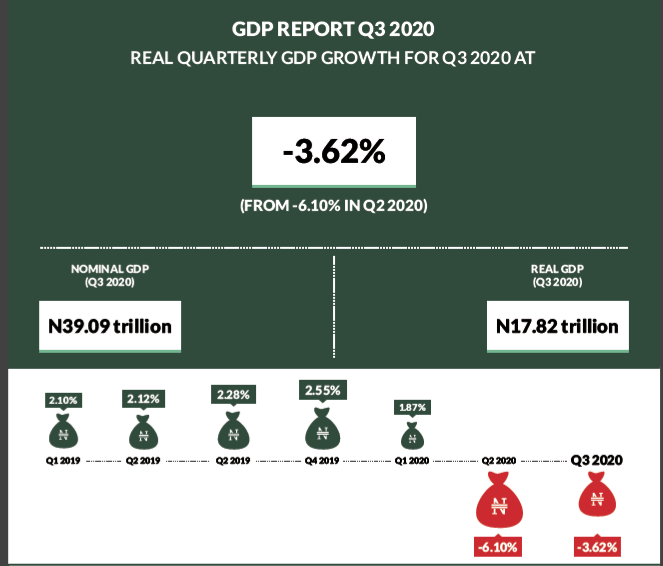Nigeria’s economy is in a state of coma as the nation wallows in a second round of recession.
According to the National Bureau of Statistics (NBS), the National Gross Domestic Product (GDP) contracted for the second quarter in a row.
According to the NBS report (PDF), Nigeria’s Q3 Real GDP contracted by a negative -3.62 per cent, following a similar trend from Q2, which also recorded a negative -6.10%.
Although there was a slight QoQ bump in the latest quarter, the nation is still a distance away from recovering from the recession regardless.
While this setback in the nation’s economy isn’t surprising, World Bank had earlier projected the same in a report filed on June 25th.
An excerpt from the report which is in accordance with the latest World Bank Nigeria Development Update reads thus:
“The collapse in oil prices coupled with the COVID-19 pandemic is expected to plunge the Nigeria economy into a severe economic recession, the worst since the 1980s.”

Source: Nigeria Bureau of Statistic (NBS)
This back-to-back decline in the Nation’s GDP has, however, been attributed to the Crude Oil Crash.
This, according to industry experts, has subsequently forced the oil sector’s revenue into an unprecedented contraction.
For instance, the oil sector revenue in Q3 contracted by a whopping 13.89 per cent.
In comparison, the oil sector only contracted by 6.49 per cent during the same period a year ago.
While the oil sector has remained the biggest stream of income for Africa’s biggest economy over the years, recent events have proven otherwise.
More so, the Nigerian economy seems to be suffering from other challenges other than the crude oil crash.
The impact of COVID-19 pandemic still persist
Despite the little regard for COVID-19 in Nigeria, the impact on the country’s economy is still largely felt.
The Nigerian economy is still struggling to regain its balance following the nationwide lockdown imposed earlier in the year.
As a result of the lockdown, most of the economic activities were halted for almost two months.
Although imposed as a containment measure, the lockdown disrupted economic services, including the banking sector.
ALSO READ: Digital Transformation Will Improve The Standard Of Living Of Nigerians – NITDA
The constraint on economic activities was, however, not only limited to the formal sector.
The informal sector activities were also halted.

Source: Medical Express
Local vendors, recreational centres, transportation among others were greatly affected as a result of the lockdown containment measure.
Coupled with the border closure, it is almost impossible for Nigeria not to have difficulties with cash inflow.
More so, considering that the country’s primary source of revenue – Crude Oil, recorded fallen global prices as a result.
Nigeria contemplates reopening of borders
Again, the crude oil crash isn’t the only factor responsible for Nigeria’s current economy.
The land borders have been locked for well over one year now.
This has led to price inflation which is currently at a 30-month high.
Experts have advised otherwise, suggesting that the reopening of borders could ease the current hardship.
Despite the advice coming from all ends, the government still appears unbothered about reopening the borders.
Although in a recent development, the Minister for Finance, Budget, and National Planning, Mrs Zainab Ahmed revealed otherwise.
She claimed that the presidential committee is making progress as to advising the president on the reopening of the nation’s borders.
According to her, an assessment of the gains of the closure has been carried out by the said committee; however, it is yet to be submitted.
ALSO READ: Impact Of Nigeria’s 45.43% Broadband Penetration On Economic Growth
She further added that the report to be sent to the president recommends that the borders be reopened.

Mrs Zainab Ahmed, Minister for Finance, Budget, and National Planning,
With the submission still pending, Mrs Ahmed, however, assured during a discussion at the 26th Nigeria Economic Summit (NES #26) that the border will be reopened soon.
Excerpt of Mrs Ahmed’s statement at NES #26:
“We have made an assessment. The president set up a committee and we have made an assessment and all the members of the committee agreed and are recommending to the president that it is time to reopen the borders.
“The objective has been met in the sense that we have been able, over these couple of months, to work together with our partners in a tripartite committee and do a joint border patrol together and reinforce the sanctity of the commitments that we made to each other.
“So, each side has learnt its lessons. Nigeria has been affecting our partners in terms of businesses that we have in Nigeria as well.
“So, we will be expecting that the borders will be reopened very soon. The date will be decided by Mr President.” Mrs Ahmed added.
Government drifts towards digital adoption and technological innovation
Where the oil sector has been experiencing a major drawback for months now, the ICT sector appears to be the next biggest revenue sector.
During the Q2 of 2020, when Nigeria first ran into another wave of recession following that of 2016, the ICT sector dominated Nigeria’s GDP by 17.8%.
Quite interestingly, the oil sector, which used to contribute the lion’s share to Nigeria’s overall GDP was only responsible for 8.93% of the entire GDP during the said period.
On the other hand, the ICT sector has recorded an upsurge in its QoQ contribution to the Nation’s overall GDP.
In the first quarter of the year, the sector also accounted for about 14.07% of the nation’s GDP, where the oil sector only contributed 9.50%.
ALSO READ: #DigitalNigeria: Artificial Intelligence Is The Refinery Of A Digital Economy – Pantami
Into the third quarter, the oil sector’s contribution to the nation’s GDP further plunged to 8.73%, about 0.20% down from Q2.
Similarly, the ICT sector’s contribution to the Nation’s GDP also hit a dip in the third quarter, accounting for only 9.57%.
However, this is still a bigger figure when compared with the corresponding quarter, Q3 2019, which stood at 8.54 without COVID-19 impact.
Nigeria government admits the need to go fully digital
Haven identified the potential that lurks within the ICT sector; the Nigerian government has been channelling more resources into digitisation.
Within the last two quarters, the government has commissioned more digital innovations than they had in the last four years.

Dr. Isa Ali-Pantami, Minister of Communications and Information Technology
Some of the prominent ones include the launch of the Digital Nigeria website.
This is a platform where Nigerians can acquire digitally-inclined skills and knowledge.
ALSO READ: NITDA Wins Big At Nigeria Tech Innovation And Telecom Awards
Also, the government has set up various innovative hubs and centres, including the recently commissioned National Centre for Artificial Intelligence and Robotics which launched as Nigeria’s first.
In addition to this, the government has been making a conscious effort to ensure that every sector of Nigeria’s economy has a digital input as it seems to be the new sustainable solution.
Recall that just a few days ago, NNPC approached NITDA, asking for support towards driving its digitisation process.
However, with the realisation and acceptance of the new reality, we at Techuncode believe that the country requires more than technology to scale through the ongoing recession.
Before we give our take on this, below are a few suggestions from the World Bank on what to do to escape the recession.
World Bank proposes key policies capable of scaling Nigeria through the recession
In its report, the World Bank out of generosity (no pun intended), suggested key policies that could possibly elevate Nigeria out of its current economic state.

Scroll.In: Malpass David R. Malpass, President of the World Bank Group
Majority of the suggestions address the nation’s foreign exchange management as well as some of its economic policies.
Here are some of the major outlines:
- Unify exchange rates into a single window, and increase exchange rate flexibility.
- Ease foreign exchange restrictions to limit inflationary pressures and increase the supply of food and key staples (e.g., health-related products).
- Refocus management of monetary policy toward the primary objective of price stability
- Phase-out land border closures to limit inflation and direct private sector development to more competitive ends
- Continue making management of public debt more transparent
- Review prudential requirements related to bank sales of non-performing loans to AMCON.
What Techuncode thinks
The current recession has made it clear that the government needs to be transparent in its operations.
Beyond transparency, we believe just like always that diversification is highly essential to the growth of Nigeria’s economy.
Just like an individual depending solely on a major stream of income exposes himself to uncertainty.
A good example of such outcomes is the current recession that Nigeria is trying hard to scale through.
Again, such mediocre practice never yields any positivity in the long run.
ALSO READ: NNPC Seeks NITDA’s Support In Using Digital Technology To Drive Petroleum Sector
It is even more pathetic where such practice is the foundation of a corrupt nation.
This year’s event has exposed so many loopholes in Nigeria’s system, which has rather been a passive one.
Despite being passive, corruption is another canker-worm that has eaten deeply into the fabric of the nation.
Although the current recession is greatly attributed to the global crude oil crash, we also think that corruption also plays a significant role.
Now, with more resources channelled into the ICT sector, the government is very optimistic about the future outcome.
However, we think if the problem of corruption is not well dealt with, all effort might prove abortive even in the long run.
More so, the Nigerian government must critically evaluate other options other than ICT to drive economic growth.



















 and then
and then